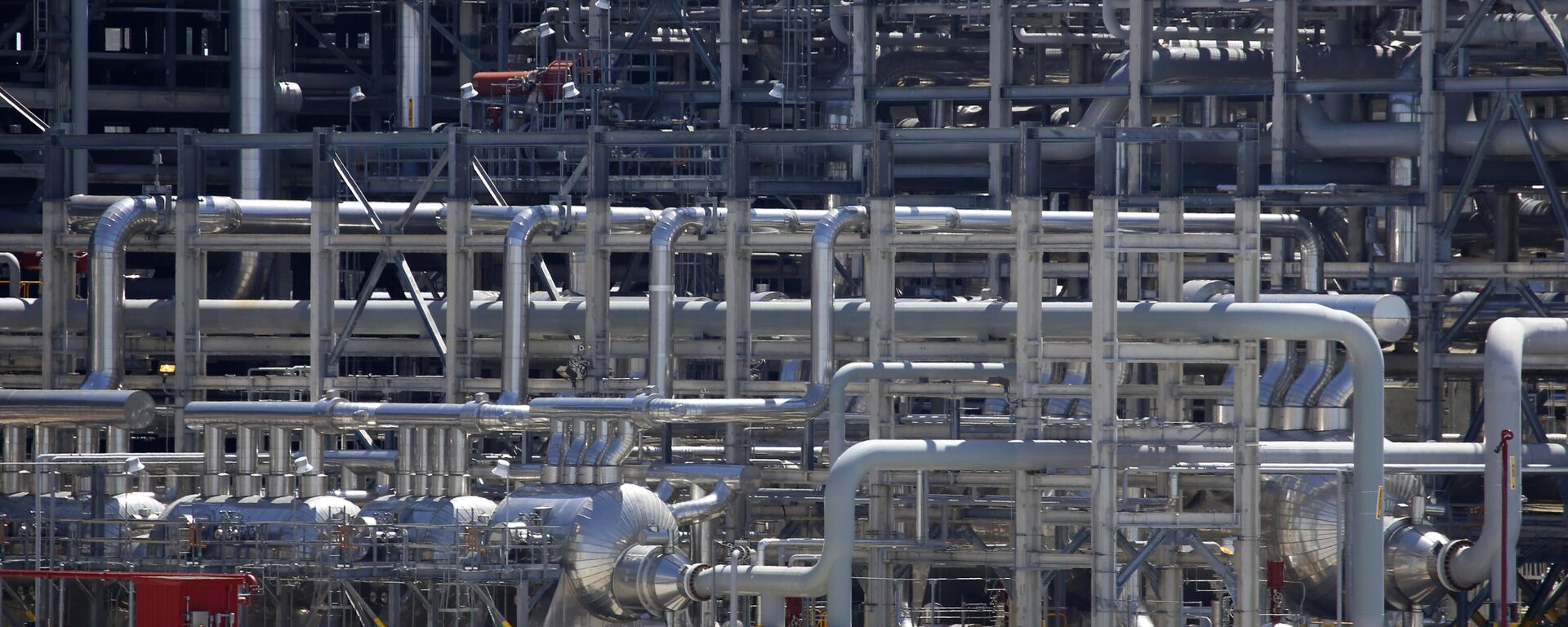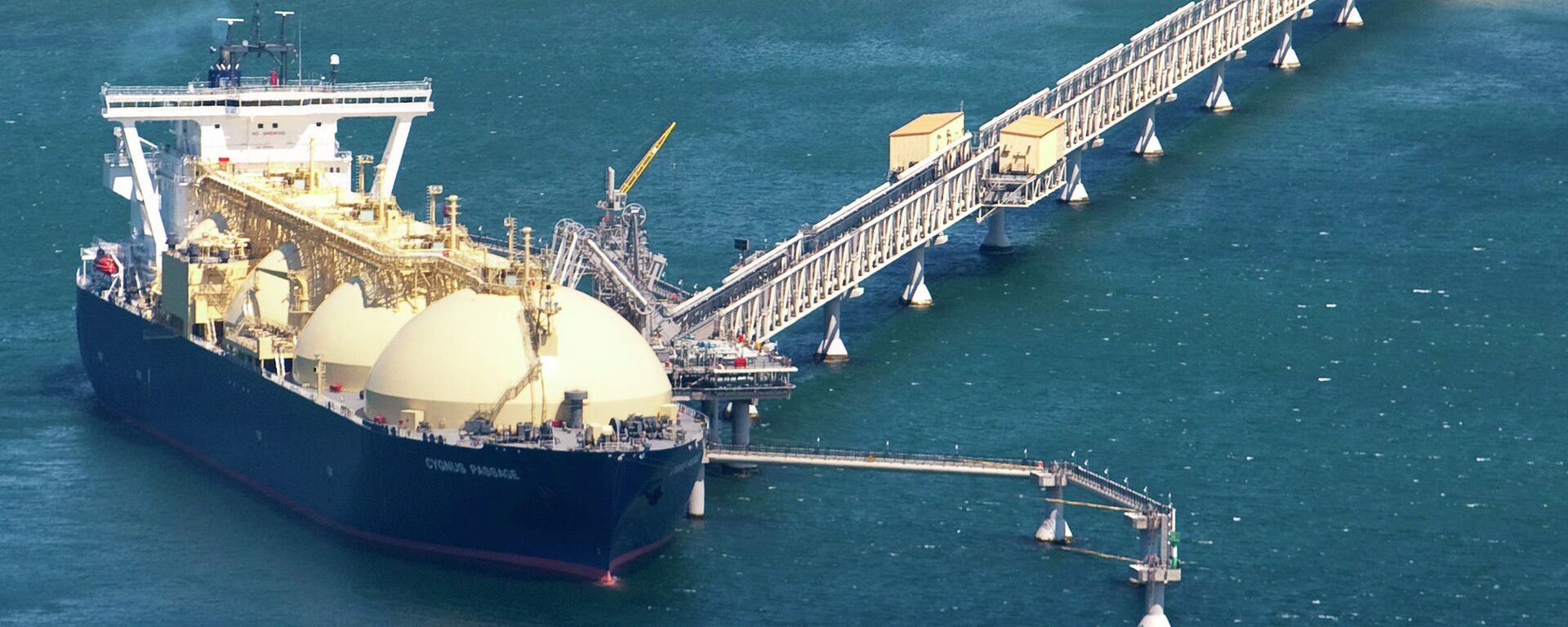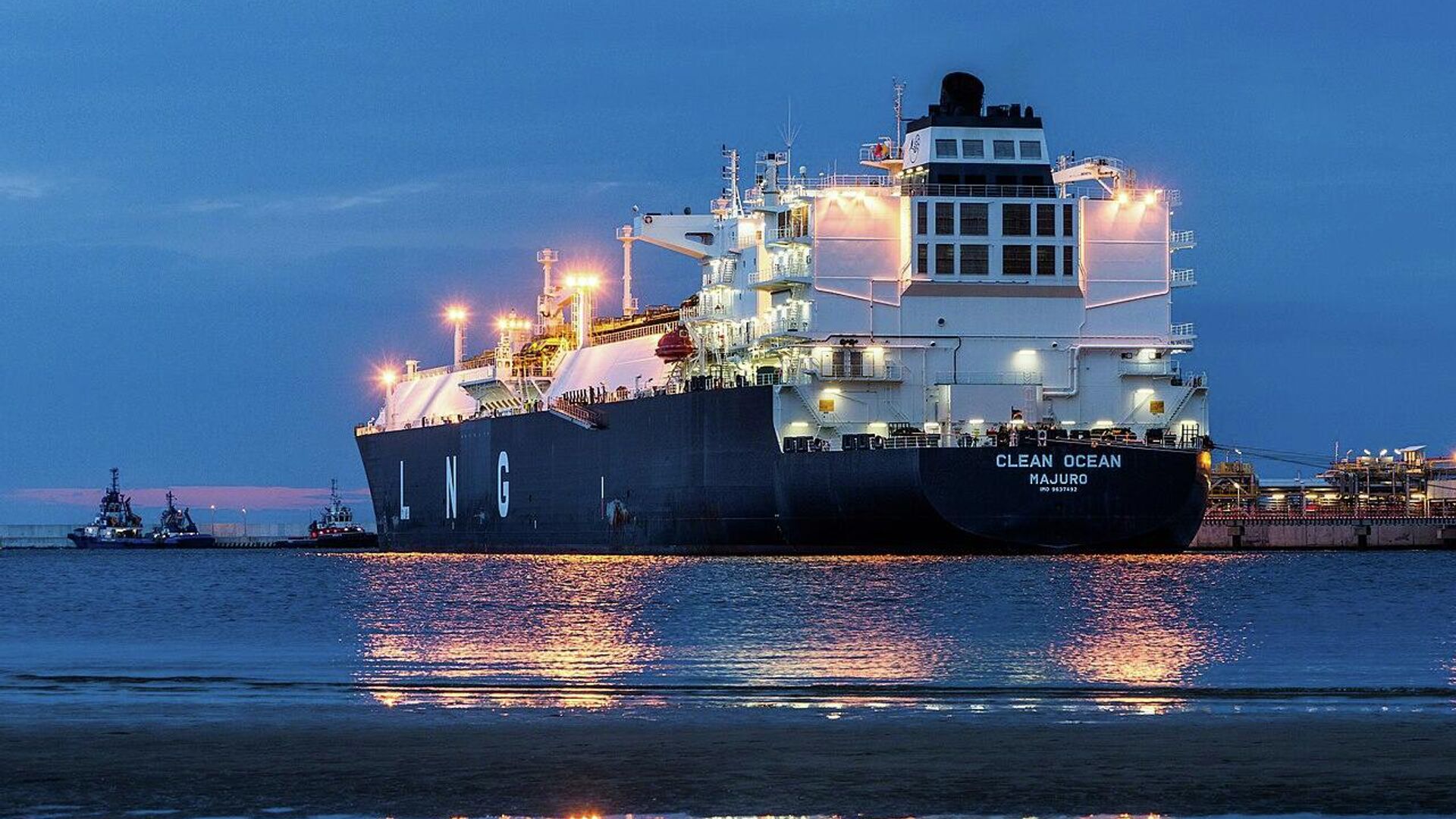https://sputnikglobe.com/20240320/eu-still-hooked-on-russian-lng-despite-blocs-hardline-rhetoric--1117446814.html
EU Still Hooked on Russian LNG Despite Bloc's Hardline Rhetoric
EU Still Hooked on Russian LNG Despite Bloc's Hardline Rhetoric
Sputnik International
Despite EU efforts to reduce reliance on Russian gas due to anti-Russian sanctions, recent data shows a surge in Russian LNG imports by France and Spain, suggesting business continues as usual.
2024-03-20T14:53+0000
2024-03-20T14:53+0000
2024-03-20T14:53+0000
world
europe
russia
spain
belgium
eurostat
liquefied natural gas (lng)
european union (eu)
https://cdn1.img.sputnikglobe.com/img/07e6/08/1e/1100167381_0:22:1280:742_1920x0_80_0_0_65ff9746ce453e2381d08309b021b8f6.jpg
Russian liquified natural gas (LNG) exports to France surged to an all-time high in 14 months (from November 2022 to late January 2024), amounting to €293 million, according to Eurostat data obtained by Sputnik.Last December, French imports of Russian LNG exports were estimated to be €244 million, marking an increase of almost €50 million over the month. Spain's LNG from Russia amounted to €274 million, 1.7 times higher than in December 2023, and a 12-month-high.Additionally, other EU countries such as Belgium, Estonia, Finland, Lithuania, the Netherlands, and Sweden have also purchased Russian LNG. By the end of January, EU nations had collectively spent €684.3 million on Russian LNG.Since the onset of Russia's special military operation in Ukraine in February 2022, the EU has sought to cut its dependence on affordable Russian gas and liquefied natural gas (LNG) while simultaneously implementing US-led sanctions against Moscow.However, despite harsh anti-Russian rhetoric by EU member states like France, recent data by the Institute for Energy Economics and Financial Analysis (IEEFA) revealed that numerous European nations remain hooked on this energy source, while some, like Belgium, facilitate LNG transshipments through their import terminals.Spain is at the forefront of EU countries importing Russian LNG, having purchased 5.21 billion cubic meters (bcm) between January and September 2023. Following closely behind are France, with 3.19 bcm, and Belgium, with 3.14 bcm. In 2023, the main EU terminals that received significant quantities of LNG shipments from Russia were located in Zeebrugge, Belgium; Montoir-de-Bretagne, France; and Bilbao, Spain, according to IEEFA.By the end of 2023, Russia had delivered 5.24 billion cubic meters of LNG to Spain, 3.82 billion cubic meters to Belgium, and 2.1 billion cubic meters to the Netherlands. Spain received 40 percent of Europe's imports, while Belgium accounted for 30 percent. It is worth noting that the supply to the Netherlands increased by 1.9 times compared to 2022.European countries have not yet banned or restricted importing liquefied natural gas from Russia. The EU is contemplating such action, but there is division among its 27 members regarding the approach to be taken. Major importers of Russian LNG, including Belgium, France, and Spain, assert that severing ties with their Russian suppliers, with whom they have long-term contracts, would not be simple.Russian President Vladimir Putin has repeatedly criticized the EU for implementing sanctions against Russia's oil and gas industry for purely political reasons. He believes that the decision was made under pressure from the EU's Western allies, rather than being based on economic considerations. Putin has voiced concern about the potential negative impact these sanctions could have on the shared economic competitiveness of both Russia and the EU.
https://sputnikglobe.com/20240128/without-russian-energy-why-is-eu-reliance-on-us-lng-fraught-with-risk-1116447096.html
https://sputnikglobe.com/20230910/lng-exports-from-russia-increased-by-several-percent-since-year-start-1113244418.html
russia
spain
belgium
Sputnik International
feedback@sputniknews.com
+74956456601
MIA „Rossiya Segodnya“
2024
Chimauchem Nwosu
https://cdn1.img.sputnikglobe.com/img/07e7/09/01/1113046371_0:99:1536:1635_100x100_80_0_0_9c5c627283eca931c39fe4852bbb301c.jpg
Chimauchem Nwosu
https://cdn1.img.sputnikglobe.com/img/07e7/09/01/1113046371_0:99:1536:1635_100x100_80_0_0_9c5c627283eca931c39fe4852bbb301c.jpg
News
en_EN
Sputnik International
feedback@sputniknews.com
+74956456601
MIA „Rossiya Segodnya“
Sputnik International
feedback@sputniknews.com
+74956456601
MIA „Rossiya Segodnya“
Chimauchem Nwosu
https://cdn1.img.sputnikglobe.com/img/07e7/09/01/1113046371_0:99:1536:1635_100x100_80_0_0_9c5c627283eca931c39fe4852bbb301c.jpg
eu lng imports, russian lng exports, lng, liquified natural gas, eu lng terminals, russian lng exports to the eu, eu lng imports from russia.
eu lng imports, russian lng exports, lng, liquified natural gas, eu lng terminals, russian lng exports to the eu, eu lng imports from russia.
EU Still Hooked on Russian LNG Despite Bloc's Hardline Rhetoric
Despite EU efforts to reduce reliance on Russian gas in the wake of the anti-Russian sanctions, recent data shows a surge in Russian LNG imports by France and Spain, suggesting that business is practically proceeding as usual.
Russian liquified natural gas (LNG) exports to France surged to an all-time high in 14 months (from November 2022 to late January 2024), amounting to €293 million, according to Eurostat data obtained by
Sputnik.
Last December, French imports of Russian LNG exports were estimated to be €244 million, marking an increase of almost €50 million over the month. Spain's LNG from Russia amounted to €274 million, 1.7 times higher than in December 2023, and a 12-month-high.
Additionally, other EU countries such as Belgium, Estonia, Finland, Lithuania, the Netherlands, and Sweden have also purchased Russian LNG. By the end of January, EU nations had collectively spent €684.3 million on Russian LNG.
Since the onset of Russia's special military operation in Ukraine in February 2022, the EU has sought to cut its dependence on affordable Russian gas and liquefied natural gas (LNG) while simultaneously implementing US-led sanctions against Moscow.

28 January 2024, 09:54 GMT
However, despite
harsh anti-Russian rhetoric by EU member states like France, recent data by the Institute for Energy Economics and Financial Analysis (IEEFA) revealed that numerous European nations remain hooked on this energy source, while some, like Belgium, facilitate LNG transshipments through their import terminals.
Spain is at the
forefront of EU countries importing Russian LNG, having purchased 5.21 billion cubic meters (bcm) between January and September 2023. Following closely behind are France, with 3.19 bcm, and Belgium, with 3.14 bcm. In 2023, the main EU terminals that received significant quantities of LNG shipments from Russia were located in Zeebrugge, Belgium; Montoir-de-Bretagne, France; and Bilbao, Spain, according to IEEFA.
By the end of 2023, Russia had delivered 5.24 billion cubic meters of LNG to Spain, 3.82 billion cubic meters to Belgium, and 2.1 billion cubic meters to the Netherlands. Spain received 40 percent of Europe's imports, while Belgium accounted for 30 percent. It is worth noting that the supply to the Netherlands increased by 1.9 times compared to 2022.
European countries have not yet banned or restricted importing liquefied natural gas from Russia. The EU is contemplating such action, but
there is division among its 27 members regarding the approach to be taken. Major importers of Russian LNG, including Belgium, France, and Spain, assert that
severing ties with their Russian suppliers, with whom they have long-term contracts, would not be simple.
Russian President Vladimir Putin has repeatedly criticized the EU for implementing sanctions against Russia's oil and gas industry for purely political reasons. He believes that the decision was made under pressure from the EU's Western allies, rather than being based on economic considerations. Putin has voiced concern about the potential negative impact these sanctions could have on the shared economic competitiveness of both Russia and the EU.

10 September 2023, 04:44 GMT





